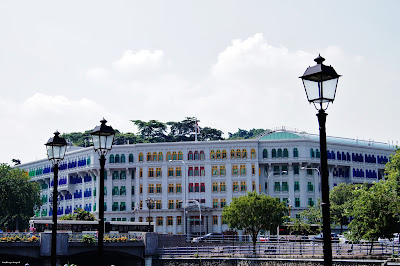Singapore
may not have a single "world heritage site" listed by United Nations
Educational, Scientific and Cultural Organization (UNESCO) but it has unique
history and culture that are worth discovering.
The government through its National Heritage Board (NHB) is actively promoting the identity building, vibrant culture and historic sites of the country. The NHB presents "heritage programmes and curates exhibitions to connect the past, present and future generations of Singaporeans through a shared experience." Singapore has myriads of museums, heritage interpretative centres, institutions and precincts that both locals and tourists can visit to learn and understand further the Singapore story.
This April, I have started walking through heritage to rediscover the “uniquely Singapore” and revisit the past of my second home.
The government through its National Heritage Board (NHB) is actively promoting the identity building, vibrant culture and historic sites of the country. The NHB presents "heritage programmes and curates exhibitions to connect the past, present and future generations of Singaporeans through a shared experience." Singapore has myriads of museums, heritage interpretative centres, institutions and precincts that both locals and tourists can visit to learn and understand further the Singapore story.
This April, I have started walking through heritage to rediscover the “uniquely Singapore” and revisit the past of my second home.
SG
River & Civic District Trails
 |
Raffles Hotel Singapore - opened in 1887 offering rooms
in an old bungalow-style building overlooking the beach
and the South China Sea.
|
 |
| The old Kalachuchi stands beside the hotel property. |
 |
| Arcade shops & restaurants within Raffles Hotel. |
 |
| War Memorial Park leading to Esplanade and Riverside. |
 |
| Exquisite Chandeliers |
 |
| Singapore River Cruise |
 |
|
Cavenagh Bridge, the oldest bridge standing on the river in its original form, named after the last Indiaappointed Governor of Singapore, Colonel (later Major General) William Orfeur Cavenagh. |
 |
|
Empress Place or Asian Civilisation Museum - traces
the history of the Singapore River since the 14th century
through artefacts, archival photos, video and sound clips. |
 |
| Raffles’ Landing Site. This statue marks the spot where Sir Stamford Raffles (1781–1826) is believed to have first landed on 29 January 1819. |
 |
| Shophouses along the side of the river. These are usually two to four-storey
terraced buildings that incorporate a business premise on the
ground floor and living quarters on the upper levels. |
 |
| Clarke Quay was a fresh water distribution point in the first half of the 19th century. Named after Sir Andrew Clarke, the Governor of the Straits Settlements from 1873 to 1875. |
 |
| Eldin Bridge - an iron bridge was constructed in 1862 and named after the Governor-General of India, Lord Elgin. |
 |
| The Parliament House. |
 |
| Resting our tired but happy feet. |








No comments:
Post a Comment